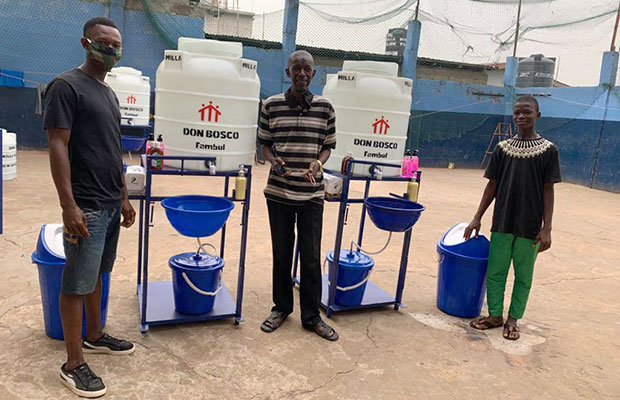
Safeguarding the Health of Homeless Youth
“We know what it means to be in quarantine, to be afraid to go out on the street, to see people die during the epidemic. We lived with Ebola.” These are the words of Father Jorge Mario Crisafulli, director of Don Bosco Fambul in Freetown, Sierra Leone—an organization that served on the frontlines during the 2014 outbreak in West Africa. Today, he and his staff of 120 are drawing on those experiences in order to keep orphaned and abandoned youth healthy and safe.
Salesian missionaries at Don Bosco Fambul have been working on behalf of Sierra Leone’s most vulnerable children since 1998, when they first arrived in the capital city of Freetown in the midst of the country’s brutal civil war. Beginning with their programs to rehabilitate former child soldiers, and assist girls and boys left orphaned and homeless by the war, missionaries have since grown their services to such an extent that Don Bosco Fambul has become one of Sierra Leone’s leading child welfare organizations. Today, it’s renowned for unwavering work on behalf of homeless, trafficked and imprisoned youth—as well as for those orphaned and victimized by natural and man-made disasters.
While COVID-19 is complicating their efforts, Don Bosco Fambul staff remain undeterred. “If or when an emergency is declared, given that the school will be closed, we will transform [our campus] into a care and reception center for 400 street children, with all the necessary precautions,” says Fr. Jorge. “We are already in the process of launching an awareness campaign and preparing for the emergency.” And they are experts on how to do it—because they’ve already done it. During the Ebola crisis, Fr. Jorge and his staff transformed a school into a home for 120 boys orphaned by the deadly disease. This unique care center, located on the Don Bosco Fambul campus, met the children’s basic needs. Precautions around health and hygiene, including a focus on preventative measures, were extremely stringent since the orphans had all been in contact with people infected by Ebola.
Labeled the “largest, most severe and most complex Ebola epidemic” in history by the World Health Organization, Ebola killed more than 11,000 people before the public health emergency ended in June 2016. In addition to housing and caring for children orphaned by the disease, Don Bosco Fambul provided food aid, health and prevention education, protective clothing, and disinfecting cleaners and supplies to impoverished families, and in areas where homeless youth were known to congregate. They also set up mobile hand washing stations so that these girls and boys could access one of the most basic means of preventing spread of the disease. Fr. Jorge is ready to mobilize many of these exact same initiatives as soon as they’re needed.
While prevention protocols in Sierra Leone were enacted quite a while ago, Salesian missionaries there share two major concerns: having enough food to nourish the children during quarantine, and having enough cleaning supplies and medicine to deal with the crisis. Therefore, they are currently working within their local networks to be prepared to assist youth who live, work and sleep on the streets of Freetown.
If the Ebola outbreak is any indication, our missionaries will provide a global example of how to manage the COVID-19 pandemic.
Our mission protects vulnerable street children around the world. What’s your mission?
Learn more about our work in Sierra Leone.

